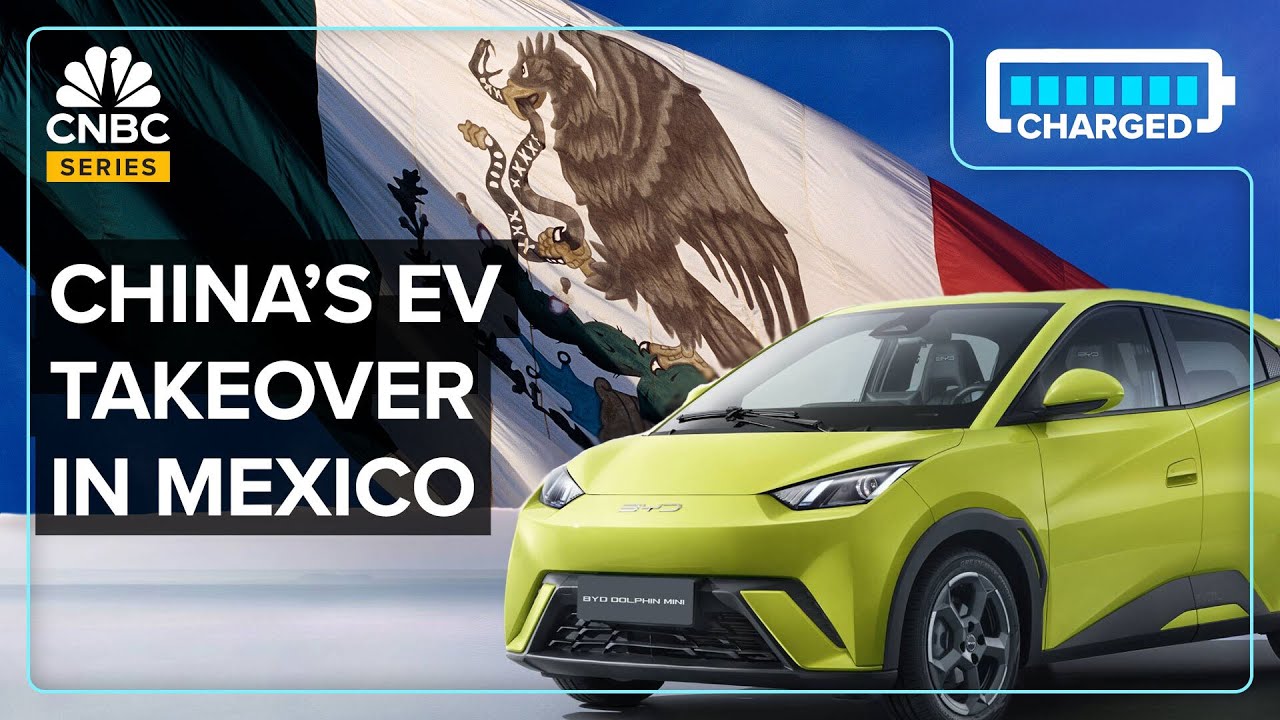The electric vehicle
revolution, shaped by trade Tensions. Concern around
competition from China is Weighing on American lawmakers
and auto companies. China's growing global auto
dominance has some lawmakers on Edge. At the center of that
conversation is a country known For its beaches and its ideal
trade proximity to the US: Mexico. Michael Dunne: The Chinese have
targeted Mexico as a prime Export market. Unknown: Across the US border,
the country has seen an influx Of Chinese made new energy cars. Juan Carlos Baker: The Chinese
automakers came to the country Very aggressively, Unknown: And now some Chinese
automakers, including Tesla Rival BYD, are announcing plans
to build factories in Mexico. But for the U.S., there's
concern this might be a part of A larger strategy. The Chinese would love to access
the US market, because there are Profits to be made in the US
market. Scott Paul: Getting in directly
to the United States market is Tricky because of the tariffs
and other obstacles, and so I Think many of these Chinese
automakers look at Mexico as a Back door in the United States
of America. Unknown: Washington has built a
wall to block cheap exports Using tariffs. But experts say
these may only be buying time. Michael Dunne: It's a Chinese
version of a Godzilla. Get Ready. This thing's coming, and
it's going to shake up the World. Unknown: So how has Mexico
become a hot spot for Chinese Auto companies, and will the
country become a pathway for These cars to drive into the
U.S.? Chinese automakers are winning
over millions of drivers around The world. Last year, China
produced over half of all
Electric vehicles sold
worldwide. Supported by Government subsidies and lagging
domestic demand, Chinese EV Makers have had to look overseas
to sell their cars. Last year, China overtook Japan to become
the world's largest auto Exporter, sending 4.9 million
cars overseas. 1.2 million of Those cars were electric. China has built up such
automotive production capacity That it can't possibly sell all
of those vehicles in China. So It has to look to other markets. Almost overnight, Mexico has
become a major market. Ilaria Mazzocco: Chinese
automakers are becoming more International. So Mexico fits in
this broader story of Chinese Companies trying to access new
markets. Unknown: In 2023 the country was
the leading importer of cars Made in China, importing a total
of $4.6 billion worth of Chinese Vehicles. That's compared to
$4.4 billion from U.S.-based Companies. In May, BYD, launched
a brand new hybrid pickup truck In Mexico. It was the first time
the company had debuted a new Product outside of China. And
Mexican consumers are quickly Embracing Chinese made EVs. Last
year, one in 10 vehicles sold in Mexico were made by a Chinese
company, outpacing every other Foreign country. Even consumers
wary of electric cars are drawn To Chinese EVs for their
affordable price tags. BYD sells Its Dolphin Mini in Mexico for
around 398,000 pesos. That's Around $21,000, a little more
than half the price of the Cheapest Tesla. Juan Carlos Baker: Chinese
automakers came to the country Very aggressively, they have to
be honest, very good promotions. Chinese cars, it's a good
product that sells at a very Reasonable price. Unknown: Experts say China's
entrance to Mexico follows a Broader strategy to target
emerging economies which are Friendlier to foreign
investment. Latin America, parts Of Asia and the Middle East have
all seen influxes of Chinese
Made cars in recent years. Felipe Munoz: Unlike the
developed economies, the Emerging ones are less
complicated, less complex in Terms of regulations. And I'm
talking about safety standards Or emissions standards. So the
Chinese car makers, if you look At the figures, they are gaining
traction faster in those Economies than in the developed
economies. Ilaria Mazzocco: For exmaple, in
Latin America, the current Government in Brazil was was
quite enthusiastic about Welcoming BYD's newest
investment. They now have a Factory in Brazil that they're
building. Similarly, I think the Biggest recipient of Chinese
investment in terms of new Electric vehicle factories is
Thailand. So usually these Companies go where they're
welcome. Unknown: Earlier year, multiple
Chinese automakers have Announced plans to open EV
factories in Mexico. Mexican States Durango, Jalisco and
Nuevo Leon have even offered Incentives to Chinese automakers
to open manufacturing Operations. These include tax
breaks, free land and help Hiring labor. Experts say this process of
nearshoring, or bringing Production closer to the final
target market, would benefit Both parties. For Mexico, the
factories would bring jobs and Limit the cost of importing so
many cars. For Chinese Companies, they could increase a
foothold in the North American Market, but this is what has
Washington worried. Mexico is already a
manufacturing powerhouse, Serving as a hub for many
international auto brands. Tesla Has been exploring manufacturing
sites in the country, although Plans are on hold for now. This
started in the mid 90s with the Signing of the North America
Free Trade Agreement, or NAFTA, Which removed tariffs on many
goods traded between the US, Mexico and Canada. The big
winners were auto companies. The Most recent iteration of the
trade agreement was enacted by
Donald Trump in 2018 it's called
the U.S.-Mexico-Canada Agreement, or the USMCA. Juan Carlos Baker: First the
Germans came, you know – Audi, BMW – and then the Japanese came
– Toyota, Honda. And then Lastly, the Koreans came –
Hyundai, Kia, and others. Some People now are arguing that the
next wave is going to be driven By Chinese companies. Scott Paul: Mexico is an
attractive production platform, Not only for Chinese companies,
but for other companies as well, In part, because of that free
trade access that it has to the American market and it can do
something that in trade terms, Is called circumvention. Unknown: In order to sell its
overcapacity of cars, China Needs to access wealthier
markets like the U.S. and Europe, but so far in the U.S.,
they've been blocked by tariffs And political tension. To get
around these barriers, China Could take advantage of the
USMCA. It would look something Like this. If a Chinese auto
company were to set up Operations in Mexico or Canada
and prove that the majority of Materials that they use to build
their cars are sourced locally, They could export their cars
into the U.S. market, virtually Duty free. For EV production,
Chinese automakers have narrowed In on Mexico for its
manufacturing infrastructure, Low labor costs and, most
importantly, proximity to the U.S.. It's a strategy that
Chinese companies have used Before. Scott Paul: For more than a
decade now, China the United States have been playing a high
stakes game of whack a ball when It comes to trade policy tariffs
and try to get into the market. And we've seen China do this in
other types of manufacturing, From appliances to auto parts to
steel and so autos is the next Logical sector for China to
scale up investment in Mexico. Unknown: It's a potential
scenario that terrifies us. Officials and automakers.
Michael Dunne: If they're able
to do that, set up in Mexico to Manufacture the United States,
they would definitely pose an Imminent threat to American auto
makers, if for no other reason, Because their costs would be
lower. Scott Paul: Really, the most
lucrative market in the world, In a lot of ways, is the
American market. We're only 5% Of the world's population, but
we consume 20% of the world's Goods. We are great at
consumption, and Americans like A deal. And if they were to see
a Chinese made EV that comes in At 15 or 20,000 thousand dollars
– they're very price motivated – And these things could
potentially wipe out a lot of The U.S. competition. Unknown: For now, none of the
major Chinese automakers have Begun building factories in
Mexico, and many have stalled Plans, citing tension with the
U.S.. Michael Dunne: The sentiment
among the Chinese automakers I've talked to is that things
are so tense between the U.S. And China right now that now is
not the right time to come and Invest in the U.S.. It's not the
right time politically, just too Much tension. Unknown: Mexican government
officials have likewise paused Incentives to Chinese
automakers. BYD has publicly Walked back in tensions to enter
the US market, at least for now. Stella Li: They're not ready.
But then for BYD, we are ready. Unknown: The USMCA is set to be
reviewed in 2026 and who leads That discussion from the White
House remains up in the air. At The Republican National
Convention in July, Donald Trump Made a pitch for Chinese
companies to set up shop in the U.S. if he were to become
president. Those plants are going to be
built in the United States, and Our people are going to man
those plans. Scott Paul: I know, and look,
I've heard Donald Trump say a Couple of times that he wants to
see those Chinese companies come To the United States. I think
that would be a massive mistake.
Unknown: Experts say this could
be detrimental to the American Auto industry. Scott Paul: When you look at,
for instance, the flat glass Industry in the United States,
you think of the big windshields That are put on automobiles. We
used to make a lot of those in The United States, all over the
state of Ohio, many other Places. Many of those companies
went out of business because, Again, China, more than a decade
ago, provided big subsidies to Its glass companies. They wiped
out the competition. So I don't Want to see that happen to
automobiles in the United States Because the Chinese auto
companies just don't have that Same cost of capital as, say,
Ford or Stellantis or GM. Unknown: Vice president Kamala
Harris, meanwhile, has not Shared her policy stance on EV
production. Michael Dunne: When will the
Chinese actually begin to invest In the United States or Mexico
to manufacture? Not before 2026 I'd say, is the quickest we'd
see something happen. And so Much depends on how the next
administration wants to play Things. Unknown: In the meantime, Mexico
still remains in the crossfire Of a trade war between two
global superpowers and the EV Revolution. CNBC reached out to
the Mexican government as well As Chinese automakers BYD SAIC
and Chery. We did not hear back By the time this video went
online.





